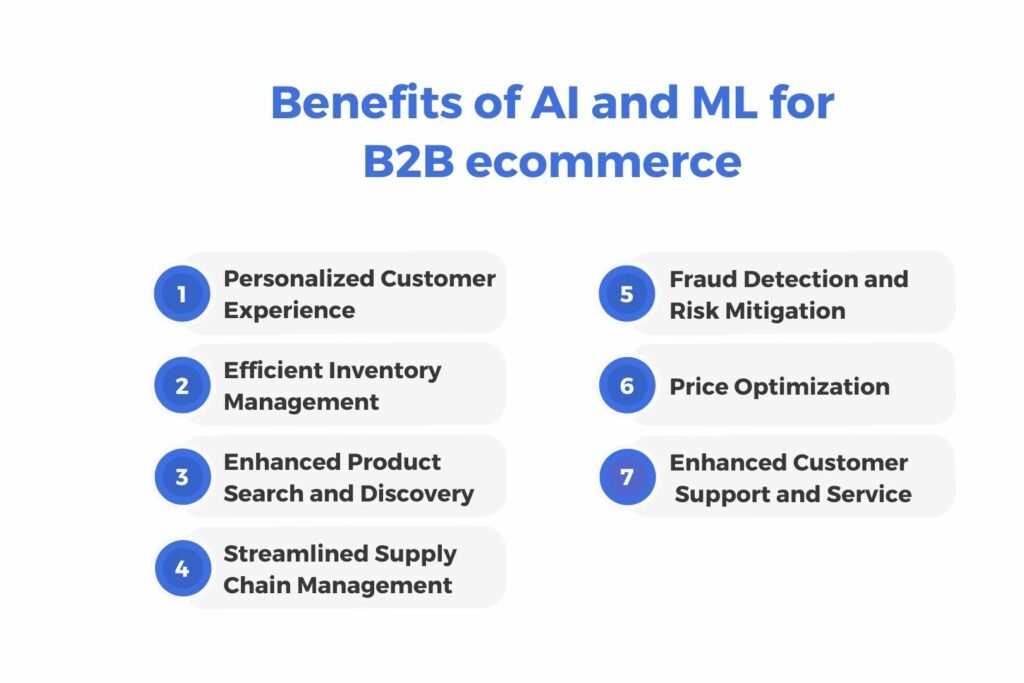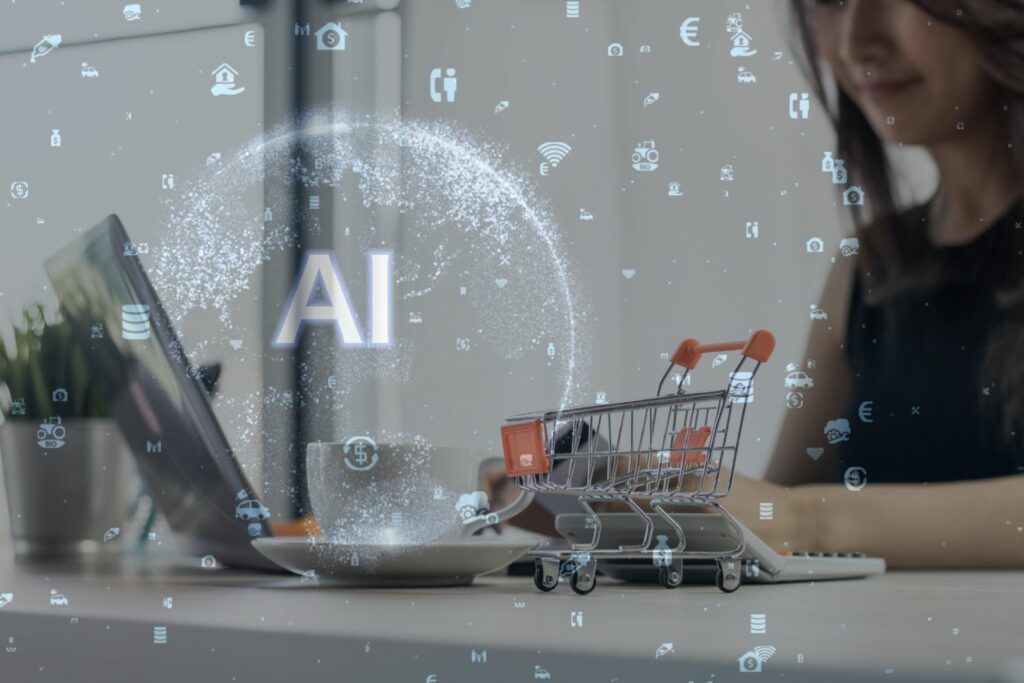The advent of artificial intelligence (AI) and machine learning (ML) has significantly transformed various industries, and B2B ecommerce is no exception. As technology continues to evolve, businesses are seeking innovative ways to improve their operations, streamline processes, and enhance customer experiences. AI and ML have emerged as powerful tools that offer unprecedented capabilities for B2B ecommerce platforms. In this blog, we’ll explore how AI and machine learning are shaping B2B ecommerce and revolutionizing the way businesses buy and sell products and services.
Whether you have experienced immersive virtual reality (VR) in a gaming environment, artificial intelligence (AI) robots in an industrial manufacturing application, or machine learning (ML) to improve 24/7 chatbots for customer support, technology is changing the way we live.
Compound Annual Growth Rates (CAGR) for AI and ML markets are projected to be around 40% by 2025 as more industry sectors adopt new technology to improve performance. For ecommerce businesses applications such as AI-driven learning and automation are revolutionizing online sales.
Improving efficiency by streamlining data entry and minimizing manual input is just the beginning. You can also optimize your customers’ experiences with near real time personalization and collect valuable information that will help you to make data-driven decisions. All your customer touchpoints and business processes could benefit from AI and ML.
Table of Contents
Chatbots and Virtual Assistants
When you visit a physical store, you will expect to find knowledgeable sales assistants to help you make your choices. Now AI technology allows you to provide immediate online advice around the clock, reducing the number of customer support specialists you need and minimizing out-of-hours working.
AI chatbots on your B2B ecommerce platform can interpret voice-based enquiries from your online customers through natural language processing (NLP) and provide personalized responses. They can improve all the time by learning from each interaction to respond more effectively to future enquiries.

Personalization
ML can offer autocomplete and search suggestions tailored to each customer’s online behaviour, making it easier for visitors to your site to find the service or product they want. As we head towards a cookie-less world, AI will be the tool to use for personalized experiences for your customers. Where huge datasets would once have been prohibitive, AI algorithms can now interrogate information quickly and effectively to create actionable insights about what your customers are looking for. This could include making personalized product recommendations on your B2B ecommerce platform based on their interests, searches and shopping history. These AI tools can be used across your ecommerce site, mobile apps and your email marketing campaigns to create consistent and enjoyable purchasing experiences.
While seven out of 10 people won’t read an email if it isn’t personalized effectively tailored campaigns can see a seven-fold increase in revenue, so AI and ML can make a significant contribution to your results.
Inventory Management
Predictive analytics using AI can also improve your inventory management so you can make the best use of your space and minimize the amount of stock you hold. You can prioritize ordering and storage based on reliable data about customer demand and estimates of your future market requirements. Include ML and your process can become more and more accurate and you will even be able to anticipate sudden changes in demand, carry out preventative maintenance when you’re less busy, and automate packing procedures to improve efficiency.
Audits using AI in your supply chain and warehouses can also help to identify pricing errors and out-of-stock items to improve your margins and customer satisfaction. You can even notify buyers when their chosen products are back in stock or if they are available from other suppliers. With real-time tracking technology you can also see the location of your goods during delivery, reducing the risk of misplaced orders. Delays and bottlenecks can be quickly identified and analyzed to minimize errors and improve customer satisfaction.
Virtual ‘try before you buy’
When people were unable to visit brick and mortar stores, virtual fitting rooms for everything from jewelry to underwear became an important alternative. Now that it’s a mainstream option brands like Gap have committed to virtual ‘try-on’ rooms, which have become an increasingly important part of their revenue stream.
IKEA’s Place app allows customers to see how furniture will look in their own homes using AR and the camera on their smartphone while AI calculates whether their choices will fit. They can also select a color or material and try different options to help make their decision. Through your B2B ecommerce portal your customers can also review plant, equipment, or office furniture in a virtual reproduction of their site to help their decision-making process.
Streamlined check-out
Amazon Go stores have tested Just Walk Out technology which combines video monitoring, sensors, beacons, and ML. AI-powered technology recognizes that there is a customer in the store and can automatically add goods to their virtual shopping carts as they take them from the shelves. Their payment will be automatically taken as they leave the store, with no need for cashiers or queuing.
For your after sales support, you could simplify and streamline replacement of consumable items and parts. Buyers can confirm that products are available at your nearest store via your B2B ecommerce portal and visit at any time of day to collect and pay for their items without the need for around the clock staffing.
Visual search and Mood detection
Customers can upload images and find similar products based on their shape and color using AI-powered visual search systems to find their ideal choices. For replacement products and parts, a simple image can allow you to recommend options to speed up the search process for your buyers and improve purchase decisions.
To improve engagement when buyers visit your B2B ecommerce portal automated customer interactions are improving all the time. Tools like service robots use AI to recognize a customer’s voice and movements. Using speech and image recognition systems, these robots learn how to detect and interpret a smile and angry, sad, or happy voice tones to improve customer service.

Benefits of AI and ML for B2B ecommerce
Personalized Customer Experience
One of the most significant advantages of AI and ML in B2B ecommerce is the ability to offer a personalized customer experience. AI algorithms analyze vast amounts of data, including past purchasing behavior, preferences, and browsing patterns, to tailor product recommendations to individual buyers. This level of personalization not only enhances customer satisfaction but also leads to increased conversion rates and higher customer loyalty. AI-driven chatbots and virtual assistants also play a crucial role in providing real-time support to customers. These intelligent bots can answer inquiries, handle customer complaints, and even suggest products based on specific requirements, improving customer service and response times.
Efficient Inventory Management
AI and ML are revolutionizing inventory management in B2B ecommerce by optimizing stock levels and predicting demand patterns. These technologies can analyze historical sales data, market trends, and external factors like weather or events to forecast demand accurately. With this insight, businesses can maintain optimal stock levels, reducing the risk of overstocking or stockouts, and ultimately improving operational efficiency. Furthermore, AI-powered inventory management systems can identify slow-moving products, enabling businesses to make informed decisions regarding discounting or promotions to clear excess inventory effectively.
Enhanced Product Search and Discovery
Navigating through vast product catalogs can be overwhelming for B2B buyers. AI-driven search algorithms and recommendation engines simplify the product discovery process. Machine learning models can understand search queries contextually and offer relevant results, even for complex and technical terms. This ensures that buyers find precisely what they are looking for, leading to a seamless shopping experience. Additionally, AI-driven recommendation engines suggest complementary products based on previous purchases or industry-specific needs, encouraging cross-selling and up-selling opportunities.
Streamlined Supply Chain Management
AI and ML are revolutionizing the supply chain management process for B2B ecommerce platforms. With real-time data analysis and predictive modeling, businesses can optimize their supply chain, reduce lead times, and mitigate risks effectively. These technologies can assess various factors like transportation costs, supplier performance, and market fluctuations to ensure that the supply chain operates at maximum efficiency. Through AI-powered predictive analytics, B2B companies can anticipate potential disruptions and plan for contingencies, minimizing the impact of unforeseen events on their supply chain.
Fraud Detection and Risk Mitigation
As the volume of B2B ecommerce transactions continues to grow, so does the risk of fraudulent activities. AI and ML technologies offer advanced fraud detection capabilities by analyzing transactional data in real-time. These algorithms can detect unusual patterns, flag suspicious activities, and help prevent fraudulent transactions, safeguarding both businesses and their customers. By leveraging machine learning algorithms, B2B ecommerce platforms can continuously learn from historical data and adapt their fraud detection systems to evolving fraud techniques.
Price Optimization
Pricing products in the B2B sector can be complex due to various factors like negotiated deals, volume discounts, and contract-specific pricing. AI and ML algorithms analyze market dynamics, competitor pricing, and customer behavior to optimize pricing strategies. These technologies can dynamically adjust prices based on demand, inventory levels, and customer segments, maximizing revenue and profitability.
Enhanced Customer Support and Service
AI-driven customer support systems have significantly improved the efficiency of B2B ecommerce platforms. Virtual assistants and chatbots can handle a wide range of customer inquiries, offering 24/7 support without the need for human intervention. This not only reduces response times but also allows customer support teams to focus on more complex issues, leading to better overall service quality.
Work with forward-looking B2B ecommerce partners
AI and machine learning are rapidly transforming the B2B ecommerce landscape. From enhancing the customer experience through personalization and efficient inventory management to streamlining supply chains and optimizing pricing strategies, these technologies offer unprecedented opportunities for businesses to stay competitive and grow. As AI and ML continue to evolve, B2B ecommerce platforms must embrace these innovations to remain at the forefront of their industries, delivering enhanced customer experiences and driving sustainable growth.
At Cloudfy we believe that AI and ML can help deliver next-generation functionality to achieve and surpass the expectations of your B2B buyers. It’s part of Cloudfy’s ability to offer predictive B2B ecommerce platforms. To find out more book a free Cloudfy demonstration.
AI and ML analyze vast amounts of data to offer personalized product recommendations, optimize search results, and provide real-time support through chatbots. This level of personalization improves customer satisfaction and loyalty, leading to increased conversion rates.
AI-powered inventory management systems can predict demand patterns, identify slow-moving products, and optimize stock levels, reducing the risk of overstocking or stockouts. This results in improved operational efficiency and cost savings.
Yes, AI and ML can revolutionize supply chain management by analyzing real-time data, optimizing transportation costs, and anticipating potential disruptions. These technologies enable businesses to operate their supply chain at maximum efficiency and plan for contingencies.
AI and ML algorithms analyze transactional data in real-time, detecting unusual patterns and flagging suspicious activities. By continuously learning from historical data, these algorithms help prevent fraudulent transactions and protect both businesses and their customers.
AI and ML analyze market dynamics, competitor pricing, and customer behavior to dynamically adjust prices based on demand, inventory levels, and customer segments. This optimization maximizes revenue and profitability for B2B companies.
AI-powered virtual assistants and chatbots offer 24/7 customer support, reducing response times and allowing human customer support teams to focus on more complex issues. This improves overall service quality and enhances customer satisfaction.
To stay competitive, businesses should embrace AI and ML innovations to deliver enhanced customer experiences, optimize inventory management, streamline supply chains, and offer efficient customer support. Partnering with forward-looking B2B ecommerce platforms like Cloudfy can help businesses achieve these goals.






